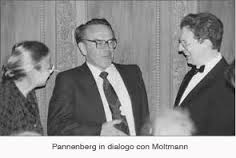Moltmann The Trinity and the Kingdom

Jürgen Moltmann, The Trinity and the Kingdom: The Doctrine of God (Harper & Row: San Francisco, 1980, 1981). Theologian Jürgen Moltmann, in his autobiography In a Broad Place, has a reference to Pannenberg saying that Moltmann began a new regard for the doctrine of the Trinity. He viewed this as generous, saying that the two of them together have brought renewed interest and focus on the Trinity. This little reflection on The Trinity and the Kingdom: The Doctrine of God (Harper & Row: San Francisco, 1980, 1981) is an effort to explore the Trinity with Moltmann, but with special attention to the written dialogue we find between these two fine theologians. On a brief personal note, Pannenberg has been my teacher since the mid-1970s. I have the privilege of being in a reading group that is slowly working through his Systematic Theology. One of the many values of this relationship over the years is his bibliography. He keeps push me to read other philosoph


